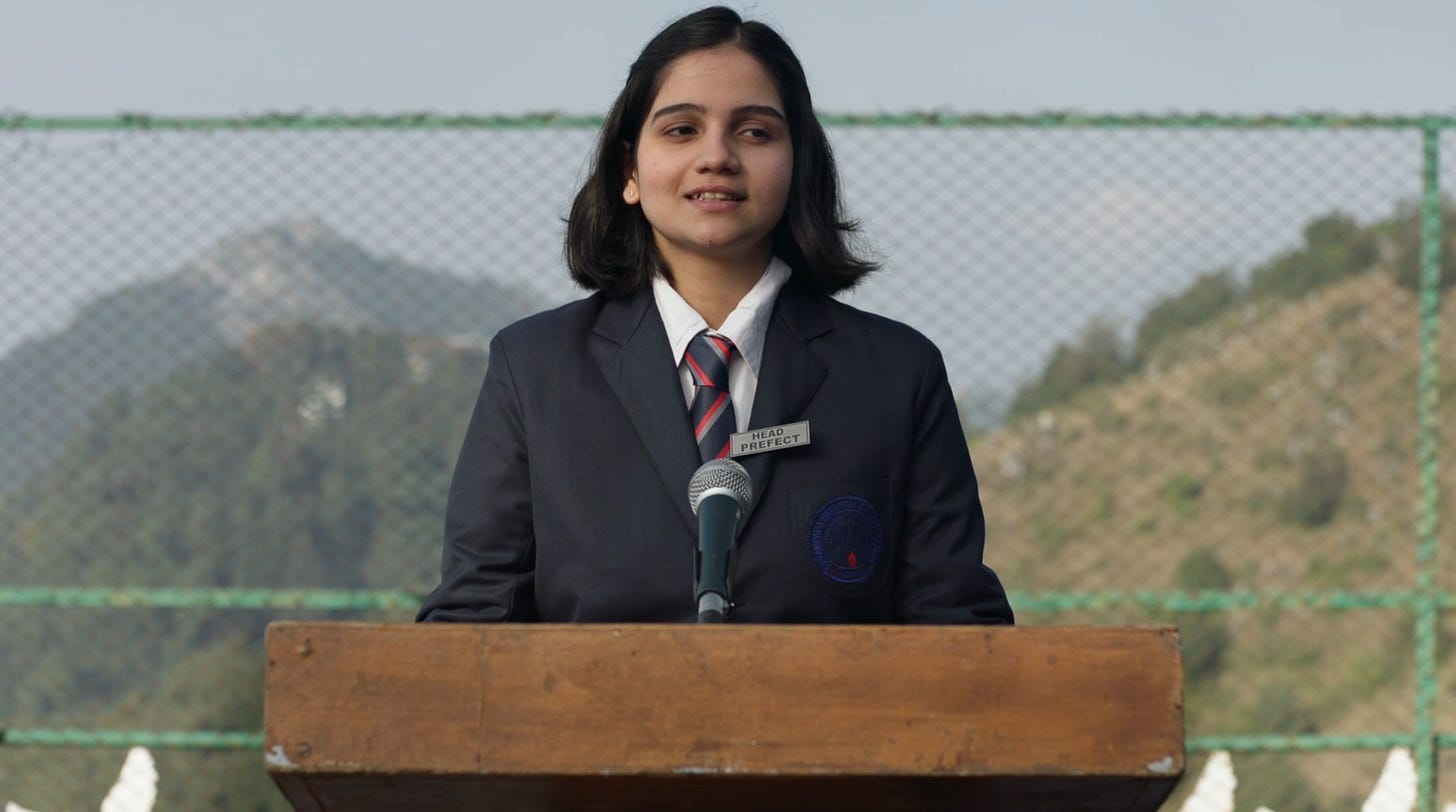Shuchi Talati’s feature debut, Girls Will Be Girls, set in the lazy, picturesque hill town of Darjeeling, tells a story that’s anything but neat and perfect. Unlike its setting, which lulls us into a dreamy stupor, Talati weaves a tale that’s subversive, messy to the core, and yet tender, empathetic, and hopeful. And it does it without being didactic. It asks us questions and leaves us to find out the answers that she just hints at.
At the center of it is Mira, a straight-A student who is just appointed the first “head prefect” of her boarding school. The school’s pledge starts thus: “I pledge to honor our age-old Indian culture and live according to it …”. But the school seems to be run like a typical missionary-run boarding school with its usual strict attitudes to sexuality and gender roles, even as it appoints a girl as a head prefect.
Mira’s stint as the head prefect coincides with her gradual sexual/romantic awakening, something that runs against her school’s puritan values (girls are warned not to talk to boys too much, and girls like Mira, that the school is banking on for academic results, are especially to be shielded from such “relationships”, as they can interfere with their academic performance). There is also Anila, her mother, who is dividing her time between Haridwar (with her husband) and Darjeeling (with her daughter), and who, while not a stereotypical mother, shares the same worldview when it comes to boys, seeing them as a distraction, more than anything else.
When Sri, a well-traveled young student in Mira’s class, the son of a diplomat, takes an interest in her, Mira’s simple, academics-centric life, is disrupted by conflicts between what she wants to achieve and her emotional/sexual internal life, between her head prefect, perfect girl persona, and her desires that run counter to it, between her conformist life, and her newfound rebellion that makes the same women who are unabashedly proud of her — her teachers, and her mother—critical of her adolescent, natural “girl” experiences.
The cheeky title of the movie, a retort at “boys will be boys”, ironically is contradicted by the travails faced by Mira for just trying to be a girl. I guess that’s intentional on the filmmaker’s part because we know where her loyalties are. The question then is, will girls be allowed to be girls? Will girls have agency over their emotional lives? Can girls have it all? After all, boys are allowed to. Because “boys will be boys”.
Talati is measured in her quest for answers, and the film is a slow burner, allowing us a lot of space to get into the minds of its central characters. Especially Mira and Anila. Anila, we learn, has been married young to Mira’s father, and possibly never had the agency that she is now reluctant to give Mira, partly, possibly, because she is worried that Mira will, like herself, end up getting swept off her feet and settle for far lesser in life than she’s capable of. But that also puts the two at loggerheads, and when Sri becomes a regular fixture at their home — mainly because Anila doesn’t want her daughter to go behind her back, and is hoping to control their relationship by being in the middle of it — and Sri establishes a bond with Anila, cracks appear in all the relationships. But it also makes Mira more rebellious, more defiant.
Supported by excellent performances by Kani Kusruti (now famous thanks to All We Imagine As Light) as Anila, and another debutant in feature form, Preeti Panigrahi as Mira — who shows an unusual talent for using facial expressions as an emotional canvass of high fidelity at that age — the film is a must watch for those who enjoy meaningful cinema. There are a few coming-of-age films made in India because exploring that critical juncture when kids become adults mentally is fraught in the Indian context where those years are supposed to be about building towards a career at all costs. Or, maybe, it’s just my theory, but I’ve sorely missed movies in this genre, which happens to be one of my favorite genres. Shuchi Talati has struck gold on her feature debut.






